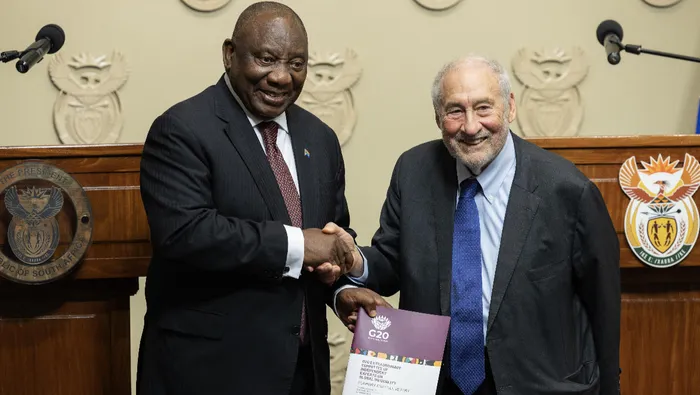
President Cyril Ramaphosa's commissioning of the G20 Extraordinary Committee on Global Inequality, chaired by one of my academic heroes, Nobel Laureate Professor Joseph Stiglitz, marks a watershed moment, says the writer.
Image: Gianluigi Guercia/AFP
AS SOUTH Africa stands on the eve of hosting the Group of Twenty (G20) Heads of State Summit from November 22 to 23, the world's most powerful economies will gather in Johannesburg to discuss the future of our planet. But here's the critical question, will these discussions remain locked in conference rooms, or will they translate into actionable change that transforms lives across Africa?
The B20, the official business voice of the G20, concludes its summit from November 18 to 20 with 30 concrete recommendations. The challenge facing South Africa's presidency is not crafting ambitious policies; it is ensuring these policies are implemented. This is where many presidencies fail. Documents get signed. Leaders shake hands. Then, six months later, little has changed. South Africa must prove that African leadership means moving decisively from policy vision to measurable action.
President Cyril Ramaphosa's commissioning of the G20 Extraordinary Committee on Global Inequality, chaired by one of my academic heroes, Nobel Laureate Professor Joseph Stiglitz, marks a watershed moment. The committee's report, delivered on November 4, warns of an "inequality emergency" with stark findings worth emphasising.
Between 2000 and 2024, the world's richest 1% captured 41% of all new wealth, while the poorest 50% shared only 1%. This extreme inequality undermines dignity, stifles economic growth, and threatens democracy itself. The committee recommends establishing an International Panel on Inequality, modelled on the IPCC, to systematically monitor trends and guide policy responses. This historic report positions inequality reduction as a core G20 priority, not peripheral rhetoric, but essential to global stability and prosperity.
The G20 Africa Engagement Framework, endorsed by Finance Ministers and Central Bank Governors in October 2025, makes South Africa's presidency unique. This five-year framework represents a paradigm shift by explicitly prioritising alignment with the African Continental Free Trade Area (AfCFTA) and the African Union's Agenda 2063, Africa's 50-year vision for continental transformation. When the G20 supports AfCFTA implementation and catalyses regional trade integration, it signals that Africa's continental economic integration is a global strategic priority aligned with reducing inequality within and between nations.
South Africa must establish structured governance mechanisms, annual progress reporting, and designated focal points within each G20 member state to ensure this framework survives and actively catalyses AfCFTA implementation beyond our presidency.
Perhaps the most critical legacy initiative is tackling Africa's ruinous cost of capital. South Africa and other African countries pay borrowing costs that are significantly higher than those of developed nations. Africa's bond yields averaged 9.8% in 2023, compared to 5.3% in Asia and Oceania. International loan spreads for African countries reach approximately 500 basis points above US Treasury rates. As the Stiglitz Report emphasizes, sovereign debt overhang is a key driver of deepening inequality and of the stifling of public spending.
The G20 Cost of Capital Commission represents a genuine opportunity to permanently change these rules. If Africa's borrowing costs can be reduced by 2-3 percentage points, the savings would translate into billions of rand annually so that governments can redirect towards education, healthcare, and infrastructure, precisely the investments required to actualise Agenda 2063's aspirations for inclusive socioeconomic development and reduce inequality.
For the first time, an African country leads the global conversation on artificial intelligence governance. South Africa's G20 Task Force on Artificial Intelligence, Data Governance, and Innovation for Sustainable Development has established groundwork for Africa's participation in shaping global AI norms.
The AI for Africa Initiative, developed by the African Union in collaboration with South Africa's presidency, is anchored in the AU's Continental AI Strategy (2025-2030) and the AU Data Policy Framework. Concrete implementation requires computing infrastructure on African soil, African-language datasets that enable AI systems to understand African contexts, and AI talent development programmes. South Africa can advance technology diplomacy across Africa, positioning the continent as an active shaper of digital sovereignty aligned with Agenda 2063.
The B20 has delivered 30 evidence-based recommendations spanning trade, climate transition, digital transformation, and infrastructure. Moving these recommendations from paper to practice requires establishing a "legacy monitoring council", a transparent mechanism that tracks progress quarterly and holds governments accountable.
Critically, South Africa's presidency must ensure that data-driven monitoring and evaluation of outcomes occur through globally relevant technology platforms. This means implementing real-time dashboards that track implementation across AfCFTA corridors, G20 member states, and African Union member nations. Technology platforms must enable transparent reporting on reductions in borrowing costs, infrastructure project timelines, AI talent pipeline metrics, and progress toward reducing inequality, aligned with the Stiglitz Report's recommendations. This data infrastructure approach ensures accountability while positioning African nations as sophisticated data stewards in global governance frameworks.
South Africa's G20 presidency succeeds only if we bridge the gap between high-level promises and implementation that touch real lives. When an entrepreneur uses AfCFTA agreements to export across borders. When a young woman in the Eastern Cape accesses AI-powered agricultural advice in her language. When a business owner accesses capital at reasonable rates. When a community connects to reliable electricity through cross-border renewable energy projects. When inequality reduction becomes measurable through the International Panel on Inequality.
This week in Johannesburg, South Africa, we can set a precedent where African leadership means turning policy vision into measurable, monitored, and meaningful implementation aligned with Africa's continental vision and global equality. That is the real legacy Africa deserves.

Sunil Geness
Image: Supplied
Sunil Geness is a South African global leader and AI researcher. He writes in his personal capacity.
** The views expressed do not necessarily reflect the views of IOL or Independent Media.